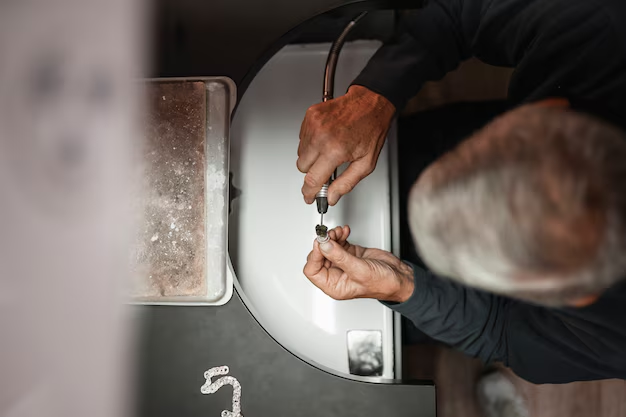Is Your Refrigerator Compressor Supposed to Be Hot? A Complete Guide
When you check your refrigerator, you might notice the compressor feeling warm or even hot to the touch. Before you hit the panic button, it's important to understand what's normal and what's not. This comprehensive guide will explore whether a refrigerator compressor should be hot and cover factors that might affect its temperature. We'll also delve into related issues and provide practical advice for maintaining your refrigerator's performance effectively.
Understanding Refrigerator Compressors
What is a Refrigerator Compressor?
The refrigerator compressor is the heart of the appliance's cooling system. It compresses the refrigerant gas, raising its temperature and pressure before it passes through the condenser coils. As the refrigerant cools, it turns into a liquid and flows through the evaporator coils inside the fridge, absorbing heat and creating a cooling effect.
Should the Compressor Be Hot?
Yes, it is normal for the compressor to be warm or even hot to the touch. The operation of the compressor involves constant compression of gas under high pressure, which generates heat. However, while slight warmth is expected, excessive heat might point to potential issues that could require attention.
🌡️ Normal vs. Concerning Compressor Temperatures
When is Heat Normal?
- Operation Duration: Compressors can run continuously, especially in warmer environments, making them naturally warm.
- Ambient Temperature: If the surrounding temperature is high, the compressor might become hotter as it works harder to maintain the fridge's internal temperature.
- Age of the Unit: Older refrigerators may have compressors that run more frequently, leading to more heat generation.
When to Worry About Excessive Heat?
- Unusually Hot Surface: If the compressor is too hot to touch comfortably, it may indicate an underlying issue.
- Refrigerator Malfunctions: Other symptoms, such as improper cooling, strange noises, or frequent cycling on and off, might accompany overheating.
- Burning Smell: A burnt electrical or chemical smell could indicate trouble.
🚦 Potential Causes for Overheating
1. Dirty Condenser Coils
If the coils at the back or beneath your refrigerator are clogged with dust and debris, they can't dissipate heat effectively. This can result in the compressor working overtime and becoming excessively hot.
2. Faulty Condenser Fan
The condenser fan plays a crucial role in maintaining compressor temperature by cooling down the coils. A malfunction could lead to overheating.
3. Refrigerant Leak
A leak may cause the compressor to work harder to maintain cold temperatures, producing excess heat.
4. Thermostat Issues
If the thermostat is faulty, it may not regulate the temperature properly, causing the compressor to run more often than necessary.
5. Electrical Problems
Faulty wiring or a problem in the refrigerator's electrical components could lead to overheating.
👨🔧 How to Address and Prevent Overheating
Routine Maintenance Tips
Clean the Coils
- Every 6 Months: Use a vacuum or coil brush to remove dust and debris.
Check the Condenser Fan
- Listen for Noise: Ensure the fan is operating quietly and efficiently.
Inspect the Thermostat
- Calibrate Regularly: Ensure it accurately reads temperatures. If temperatures fluctuate, consider thermostat recalibration.
Maintain Proper Airflow
- Ensure Space Around Your Fridge: Leave adequate space around the appliance for heat dissipation.
Examine Electrical Components
- Check Cord and Plug: Look for signs of wear or damage and ensure intact connections.
When to Call a Professional
- Persistent Overheating: If maintenance and cleaning do not resolve the issue, consider consulting a technician.
- Complex Electrical or Refrigerant Problems: These require professional expertise to handle safely and effectively.
🔧 Related Refrigerator Maintenance Tips
The Importance of Defrosting
Modern refrigerators often have auto-defrost features, yet ice buildup can still occur, impacting performance and efficiency. Regular manual checks maintain optimum functionality.
Door Seal Inspection
A failing door seal can let warm air enter, prompting the compressor to work harder. Regular inspection and replacement of faulty seals can prevent unnecessary strain on the appliance.
Monitor for Leaks
Whether it's a refrigerant or a water leak, early detection can save energy and extend the fridge's life. Check under and behind your fridge periodically for signs of moisture.
📊 Quick Summary: Keep Your Compressor Running Smoothly
Here's a concise list of practical tips to ensure your refrigerator stays in top-notch condition:
- 🧹 Clean condenser coils bi-annually.
- 🔄 Verify the operation of the condenser fan.
- 🌡️ Regularly check the thermostat for accuracy.
- 🚪 Inspect door seals for effective closure.
- 🔧 Address leaks and seek professional help for repairs.
- 🧊 Defrost occasionally to prevent ice build-up.
These steps will not only help prevent compressor overheating but will also boost your refrigerator's overall efficiency.
Bringing It All Together
Having a clear understanding of your refrigerator's compressor temperature is integral to maintaining its functionality and longevity. While some warmth is standard due to the nature of its work, excessive heat warrants immediate consideration. With routine maintenance and quick action when issues arise, you can ensure that your refrigerator operates smoothly for many years to come. These practices help prevent costly repairs and ensure your appliance continues to run efficiently, keeping your food fresh and your energy bills in check.

